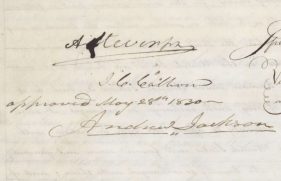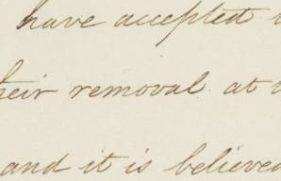This petition, signed by 3,352 Cherokee, urges the Senate not to ratify the New Echota Treaty because it is “so utterly repugnant to reason and justice and every dictate of humanity.” The treaty stripped the tribe of their land and rights, and eventually led to the “Trail of Tears.”
The National Cherokee Council claimed the treaty was invalid because the Principal Chief did not sign it and the Cherokee that did were not authorized to. The Council wrote that they had “…full confidence that under such circumstances the voice of weakness itself will be heard in its cry for Justice.”
A small group of Cherokee leaders who favored moving to land west of the Mississippi River and representatives of the U.S. government had signed the Treaty of New Echota in late December 1835. It required the eastern Cherokees to exchange their lands for land in the Indian Territory—what is today eastern Oklahoma. The Cherokees were to complete their removal to Indian Territory within two years.
Others opposed the treaty as well. New Englanders, religious groups, and missionaries who objected to the policy of removal flooded Congress and the President with petitions and memorials. Congress responded by tabling the petitions and memorials (laying them aside).
All but about 2,000 Cherokees ignored the treaty and refused to move to the West or begin making preparations for removal. This reaction was encouraged by Cherokee Chief John Ross and continued for nearly two years.
In 1838, Maj. Gen. Winfield Scott was ordered to push the Cherokee out. He was given 3,000 troops and the authority to raise additional state militia and volunteer troops to force removal. Despite Scott’s order calling for removal in a humane fashion, this did not happen. During the fall and winter of 1838-39, the Cherokees were forcibly moved from their homes to the Indian Territory—some having to walk as many as 1,000 miles over a four-month period. Approximately 4,000 of 16,000 Cherokees died along the way, a sad chapter in American history known as the “Trail of Tears.”
The Cherokee Petition in Protest of the New Echota Treaty is a part of America’s 100 Docs, an initiative of the National Archives Foundation in partnership with More Perfect that invites the American public to vote on 100 notable documents from the holdings of the National Archives. Visit 100docs.vote today.





